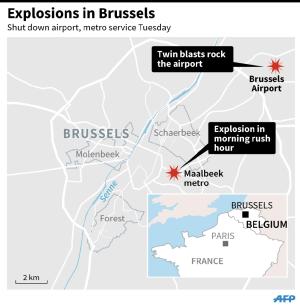Smoke rises from the Maalbeek metro station in Brussels following a blast at the station close to the …
Brussels (AFP) - A string of explosions rocked Brussels airport and a city metro station on Tuesday, killing at least 13 people, according to media reports, as Belgium raised its terror threat to the maximum level.
Two explosions targeted the main hall of Zaventem Airport at around 8:00 am (0700 GMT), with a third hitting the Maalbeek metro station, near the European Union's main buildings, just as commuters were making their way to work in rush hour.
Belgian media reports said at least 13 people had been killed and 35 injured at the airport, while an AFP reporter said at least 15 people with bloodied faces were being treated by emergency services outside the metro station.
The blasts come days after the dramatic arrest in Brussels on Friday of Salah Abdeslam, the prime suspect in the Paris terror attacks that killed 130 people in November, after four months on the run.
There were chaotic scenes at the airport as passengers fled in panic, with a thick plume of smoke rising from the main terminal building.
The blasts smashed the windows of the departure hall and sent ceiling tiles shattering to the floor.
Witnesses told Belga news agency there had been shots and shouts in Arabic at the airport before the blasts hit at the airport on the northwest outskirts of Brussels.
- 'Attack against democratic Europe' -
"There have been two explosions at the airport. Building is being evacuated. Don't come to the airport area," the airport said on Twitter, as police cars and rescue vehicles rushed to the scene.
"All airport operations have been suspended until further notice," it said.
Interior Minister Jan Jambon announced that Belgium's terror threat had been raised from three to a maximum of four.
Airports in neighbouring France, Germany and the Netherlands as well as Britain swiftly boosted security in response.
The blasts triggered a transport shutdown in Brussels, with all flights halted in and out of the airport and the city's metro, tram and bus services suspended.
European Union staff in Brussels, where the 28-nation bloc has its headquarters, were told to stay indoors or at home.
Sweden's Prime Minister Stefan Lofven branded the blasts an "attack against democratic Europe", while British premier David Cameron tweeted: "I am shocked and concerned by the events in Brussels. We will do everything we can to help."
- Blood in the elevator -
"We heard the explosion and felt the blowback," Jean-Pierre Lebeau, a French passenger who had just arrived from Geneva, told AFP, adding that he had seen wounded people and "blood in the elevator".
"First we were kept together by the border police, then they gave us the order to evacuate," Lebeau said.
The ceilings collapsed, he said, describing a smell of gunpowder at the scene.
With shock on their faces, Jean-Pierre Herman embraced his wife Tankrat Paui Tran, who he had just gone to collect from the airport after her flight from Thailand.
"My wife just arrived," Herman said. "I said hello, we took the elevator and in the elevator we heard the first bomb.
"The second exploded just when we got off. We ran away to an emergency exit. I think we are very lucky."
An AFP correspondent on their way to the airport said roads to the terminal had been blocked and trains halted.
Charlotte McDonald-Gibson, a British journalist living in Brussels, told AFP there had been "total confusion" at the airport, where she was having breakfast.
"Suddenly staff rushed in and said we have to leave," she said.
"They rushed out and into the main terminal A departures building. Nobody knew what was going on.
"It was total confusion, people were just standing around wondering what was happening."
There was no immediate confirmation of the cause of the blasts.
Europe's main stock markets retreated as the news broke, with London's benchmark FTSE 100 index dropping 0.6 percent compared with Monday's close and Frankfurt's DAX 30 shedding 1.1 percent.



